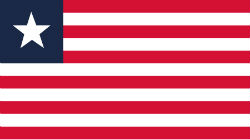The judicial system is based on Anglo-American Common law, with constitutional recognition of African customary law.
Country overview
Population
4.73m
President
Joseph Boakai
Capital city
Morovia (0.94m people)
Other major cities
Gbarnga (0.05m people)
Kakata (0.03m people)
Bensonville (0.03m people)
Currency
Liberian Dollar (L$) and United States Dollars (US$)
Major industries
Mining; palm oil; rubber production; and off-shore oil.
Languages
English
Major religions
Christianity (85.5%) Islam (12.2%)
- Capital Markets
Liberia has no stock exchange or any appreciable capital market. The Central Bank of Liberia (CBL) has been issuing Treasury bills (T-bills) in an effort to develop a capital market. Foreign investors can participate in T-bill auctions, although the auctions are often over-subscribed.
- Competition Regulation
Liberia recently passed a competition act entitled “The Act to Enact the Competition Law to Provide for an Efficient Free Market System”. The act was passed into law in 2016 to regulate the Market System and to curtail the abuse of market power.
Section 5.1 of the act states that “it is unlawful for any person to conspire, agree or arrange with a competitor with respect to a product regardless of the effect on competition or consumers, to:
- fix, maintain, increase or control the price for the supply of the product;
- allocate sales, territories, customers or markets for the production or supply of the product; or
- fix, maintain, control, prevent, lessen, or eliminate the production or supply of product.”
The act makes it unlawful for persons to enter into an agreement that would amount to bid rigging, price maintenance and/or to get involved with anti-competitive behaviour.
- Corruption / transparency
The Transparency International 2017 global corruption and transparency perception index placed Liberia at 122/180 in relations to transparency, and 31/100 on its corruption scale. The TI index global ratings for the last ten or more years have placed Liberia around the same low level of transparency and high corruption, although has an Access To Information Act and an Information Commission as well as several anti-graft institutions including the General Auditing Commission (GAC), the Liberia Anti-Corruption Commission (LACC), and (c) the Financial Intelligence Unit of Liberia (FIUL).
- Disputes
Resolution of disputes is done mainly through judicial proceedings, although arbitration and mediations are also recognized and used.
A key rule of Liberian law relative to dispute resolution is that every party to a judicial proceeding has an inviolable right to appeal and have his or her appeal heard by the Supreme Court of Liberia, which is the final arbiter of all disputes. Thus, no judicial proceedings end in Liberia unless the Supreme Court has heard any appeals taken by a party to the proceedings. There are of course rules prescribing how an appeal may be perfected, and how and when a party may lose its right of appeal. This inviolable right of appeal makes judicial resolution of dispute a lengthy and frustrating procedure in Liberia.
An alternative to judicial dispute resolution mechanism is arbitration, which is expressly recognized under Liberian law. Indeed, a written agreement to agree to arbitrate any controversy existing at the time of the making of the agreement or any controversy thereafter arising is valid and enforceable under Liberian law, without regard to the justiciable nature of the controversy, and irrevocable except upon such grounds as exist for the revocation of any contract. A party to an arbitration agreement may be compelled to submit to arbitration if he or she delays or refuses to submit to arbitration upon being served notice of arbitration.
A third dispute resolution mechanism used in Liberia is mediation and conciliation, although at a limited scale compared to judicial proceedings and arbitration.
Foreign judgments and/or arbitral awards are enforceable in Liberia upon proper application to a court of competent jurisdiction. A foreign judgment in a case in which the defendant did not appear, although a party thereto, shall not be admissible against him under Liberian law. If any person appeared on his behalf in the case, the foreign judgment shall be admissible unless he shows that the appearance was without his authority.
A foreign judgment is not conclusive of any act whatsoever, but is some evidence, although the practice is to presume its conclusiveness and, upon application duly made, to proceed with enforcing it unless proper objections based on law are made.
The contractual choice of foreign law to govern a transaction and the submission to the jurisdiction of a foreign court are legally valid and binding and do not contravene the laws of the Republic of Liberia.
Liberian statutory law permits Liberian courts to recognize the common law of the United States or England as Liberian law where Liberian law, statutory or common, is silent on the issue at hand.Enforcement of arbitral awards
Arbitration awards are enforceable in Liberia by the Liberian courts. Specifically, the Civil Procedures Law of Liberia provides that upon written motion of a party, the Court shall confirm an award unless, within the time prescribed by statute, grounds are urged by another party for vacating, modifying, or correcting the award. An arbitral award may be vacated where (a) the award was procured by corruption, fraud, or other undue means, (b) there was partiality in an arbitrator appointed as a neutral, except where the ward was by confession; or there was corruption or misconduct in any of the arbitrators; (c) or an arbitrator or the agency or person making the award exceeded his powers or rendered an award contrary to public policy; or (d) the arbitrators refused to postpone the hearing upon sufficient cause being shown, or refused to hear evidence material to the controversy, or otherwise conducted the hearing contrary to the provisions of contract or as provided by law.
Regarding foreign arbitral award, Liberia is a party to 10 June 1958 New York Convention on the Recognition of Enforcement of Foreign Arbitral Awards (the “New York Convention”). Hence, subject to compliance with the New York Convention, a foreign arbitral award may be enforced by the courts in Liberia without re-examination or re-litigation of the matters thereby adjudicated.
- Foreign investments
Liberia is a market-based economy and is receptive to foreign direct investment. Liberia has the Investment Act of 2010, which provide extensive provisions on foreign investments while the Amended and Restated Revenue Code (2011) provides investment incentives for foreign and local investments such as loss carried forward, tax deduction on eligible equipment, machinery and other capital goods.
Liberia is host of billions of dollars of foreign investment, especially in its agricultural, forestry, mining and other extractive industries.
The Constitution of Liberia guarantees against expropriation, and the exercise of eminent domain is on specified ground and then only upon payment of prompt and just compensation to the private owner who also has a constitutionally mandated right of first refusal to buy the property after it ceases to be used for the purpose for which it was taken.
- Regulation
Like many modern states, Liberia has a wide range of regulation relating to environmental protection, health and safety, business registration, provision of financial services, etc. Banking, insurance and pharmaceutical industries are regulated industries, and the establishment and operation of any enterprise in any of such regulated sectors requires compliance with prescribed requirements.
- Taxation
Liberia has a comprehensive tax code which established the following as the taxes recognized and in effect in Liberia:
- Personal and Business Income Tax
- Goods and Services Taxes
- Excise Tax
- Customs Duties; and
- Real property Tax.
Besides the foregoing, there are also some defined obligatory payments (such as concession fees, social development fund charges, signature bonus payments, etc) that are required under mining or petroleum agreements between the Government of Liberia. Such payments are not taxes, but are collected according to the procedures of the Tax Code as if they were tax liabilities and any person obligated to make any of such payments may be treated as a taxpayer.
The corporate profit tax is 25%, while every payment of income, interest, dividends or royalty to persons not resident of Liberia is subject to withholding tax at the rate of 15%.
